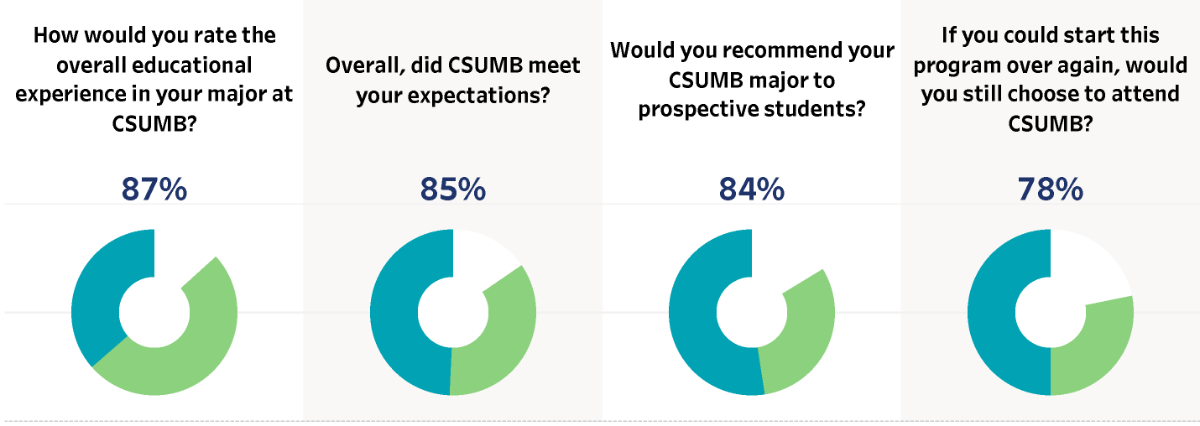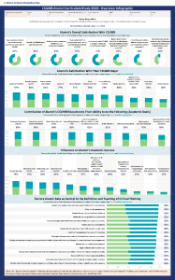IAR Insights - Spring 2021

In this issue:
Results of the 2020 Alumni Curriculum Study (Undergraduate and Graduate Alumni)
- What was alumni's overall satisfaction with CSUMB?
- How satisfied were alumni with aspects of their CSUMB major?
- How did CSUMB education contribute to alumni's abilities?
- What were the influences on alumni's academic success?
- What were the factors alumni rate as central to the definition and teaching of critical thinking?
- Where can you find more information about the 2020 Alumni Curriculum Study and see data related to your program?
What was alumni's overall satisfaction with CSUMB?
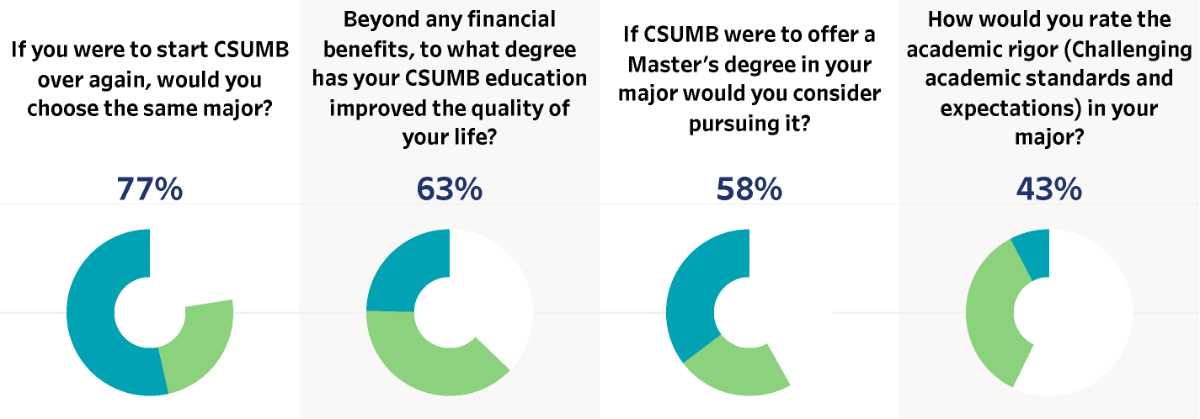
*Note: Combined response percentages may differ from sum of other response categories due to rounding.
Question Satisfied Responses Very Satisfied Responses Combined Satisfied and Very Satisfied Responses* How would you rate the overall educational experience in your major at CSUMB? 50% 36% 87% Question Probably Yes Responses Definitely Yes Responses Combined Probably Yes and Definitely Yes Responses* Overall, did CSUMB meet your expectations? 35% 49% 85% Question Probably Yes Responses Definitely Yes Responses Combined Probably Yes and Definitely Yes Responses* Would you recommend your CSUMB major to prospective students? 31% 52% 84% Question Probably Yes Responses Definitely Yes Responses Combined Probably Yes and Definitely Yes Responses If you could start this program over again, would you still choose to attend CSUMB? 28% 50% 78% Question Probably Yes Responses Definitely Yes Responses Combined Probably Yes and Definitely Yes Responses* If you were to start CSUMB over again, would you choose the same major? 24% 54% 77% Question Considerably Responses A Great Deal Responses Combined Considerably and A Great Deal Responses Beyond any financial benefits, to what degree has your CSUMB education improved the quality of your life? 38% 25% 63% Question Probably Yes Responses Definitely Yes Responses Combined Probably Yes and Definitely Yes Responses* If CSUMB were to offer a Master’s degree in your major would you consider pursuing it? 23% 35% 58% Question Very Rigorous Responses Extremely Rigorous Responses Combined Very Rigorous and Extremely Rigorous Responses How would you rate the academic rigor (Challenging academic standards and expectations) in your major? 35% 8% 43%
How satisfied were alumni with aspects of their CSUMB major?
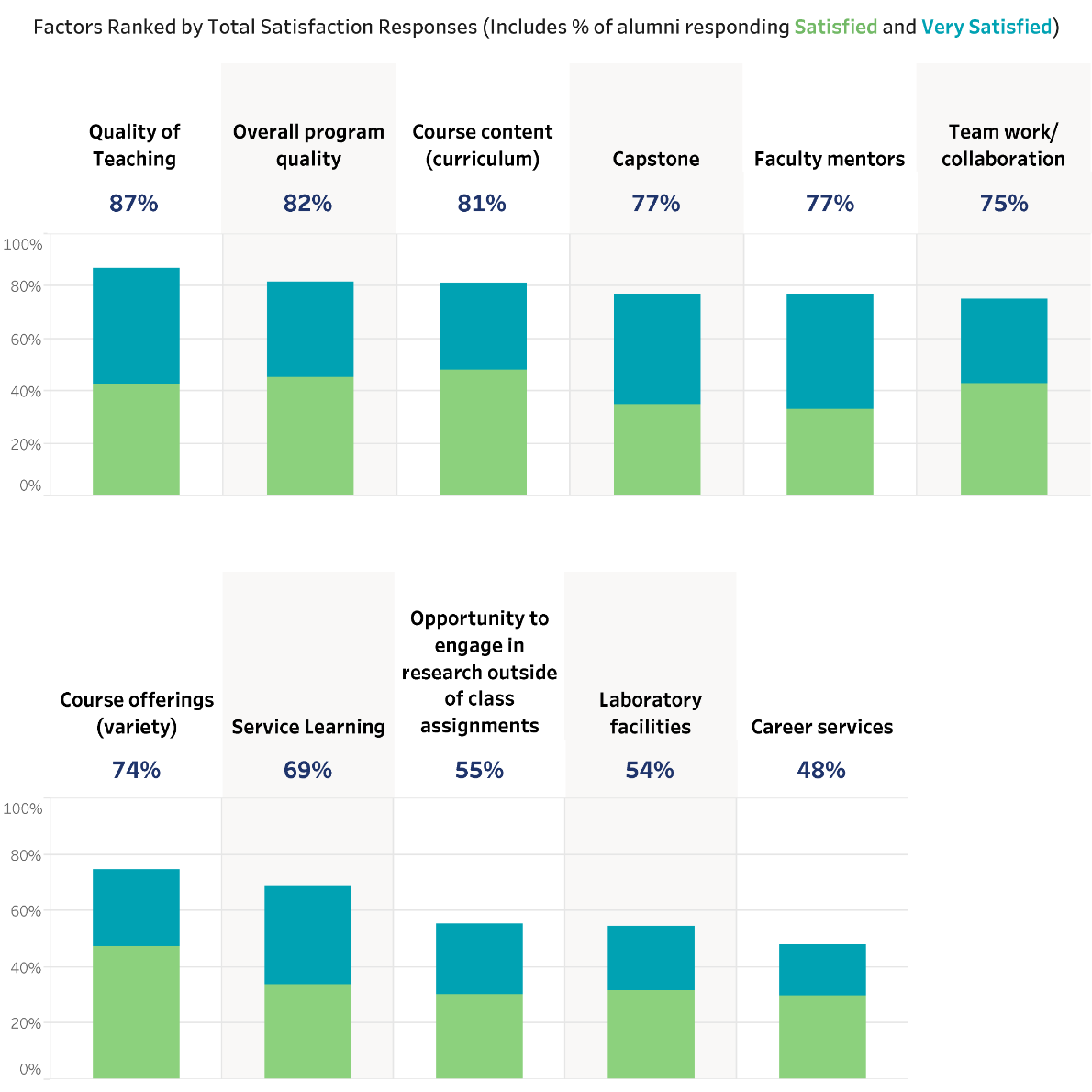
Responses to the question: “Please rate your satisfaction with your major on...”
*Note: Combined response percentages may differ from sum of other response categories due to rounding.
Question Satisfied Responses Very Satisfied Responses Combined Satisfied and Very Satisfied Responses* Quality of Teaching 42% 44% 87% Overall program quality 45% 36% 82% Course content (curriculum) 48% 33% 81% Capstone 35% 42% 77% Faculty mentors 33% 44% 77% Teamwork / collaboration 43% 32% 75% Course offerings (variety) 48% 27% 74% Service Learning 34% 35% 69% Opportunities to engage in research outside of class assignments 30% 25% 55% Laboratory facilities 32% 22% 54% Career services 30% 18% 48%
How did CSUMB education contribute to alumni's abilities?
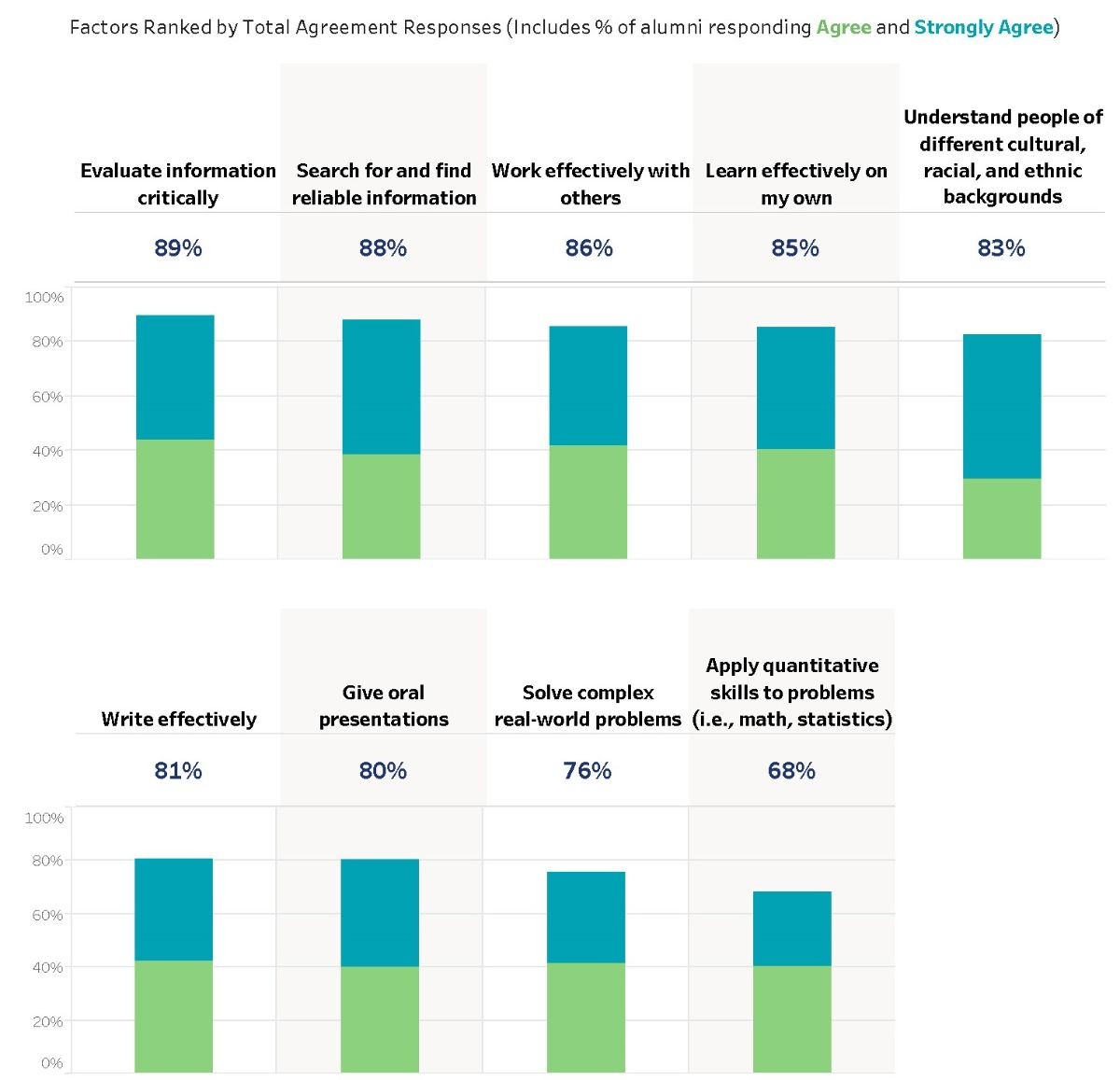
Responses to the question: “My CSUMB education contributed substantially to my ability to do the following…”
*Note: Combined response percentages may differ from sum of other response categories due to rounding.
Question Agree Responses Strongly Agree Responses Combined Agree and Strongly Agree Responses* Evaluate information critically 44% 45% 89% Search for and find reliable information 39% 49% 88% Work effectively with others 42% 44% 86% Learn effectively on my own 40% 45% 85% Understand people of different cultural, racial, and ethnic backgrounds 30% 53% 83% Write effectively 42% 38% 81% Give oral presentations 40% 40% 80% Solve complex real-world problems 42% 34% 76% Apply quantitative skills to problems (i.e., math, statistics) 41% 27% 68%
What were the influences on alumni's academic success?
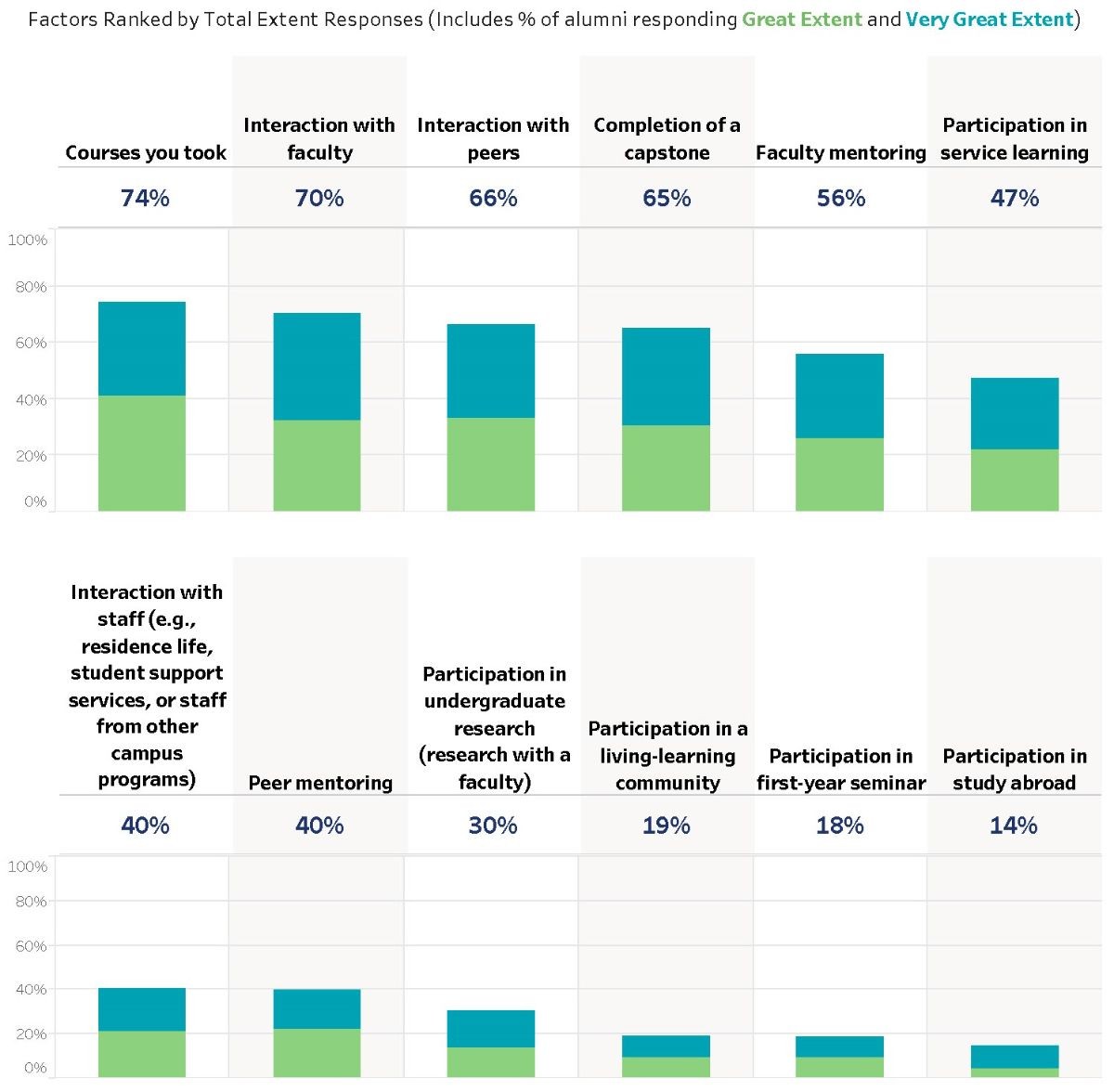
Responses to the question: “To what extent did the following influence your academic success?”
*Note: Combined response percentages may differ from sum of other response categories due to rounding.
Question Great Extent Responses Very Great Extent Responses Combined Great Extent and Very Great Extent Responses* Courses you took 41% 33% 74% Interaction with faculty 32% 38% 70% Interaction with peers 33% 33% 66% Completion of a capstone 31% 34% 65% Faculty mentoring* 26% 29% 56% Participation in service learning 22% 25% 47% Interaction with staff (e.g., residence life, student support services, or staff from other campus programs) 21% 19% 40% Peer mentoring 22% 18% 40% Participation in undergraduate research (research with a faculty) 14% 16% 30% Participation in a living-learning community 10% 9% 19% Participation in first-year seminar* 10% 9% 18% Participation in study abroad* 5% 10% 14%
What were the factors alumni rate as central to the definition and teaching of critical thinking?
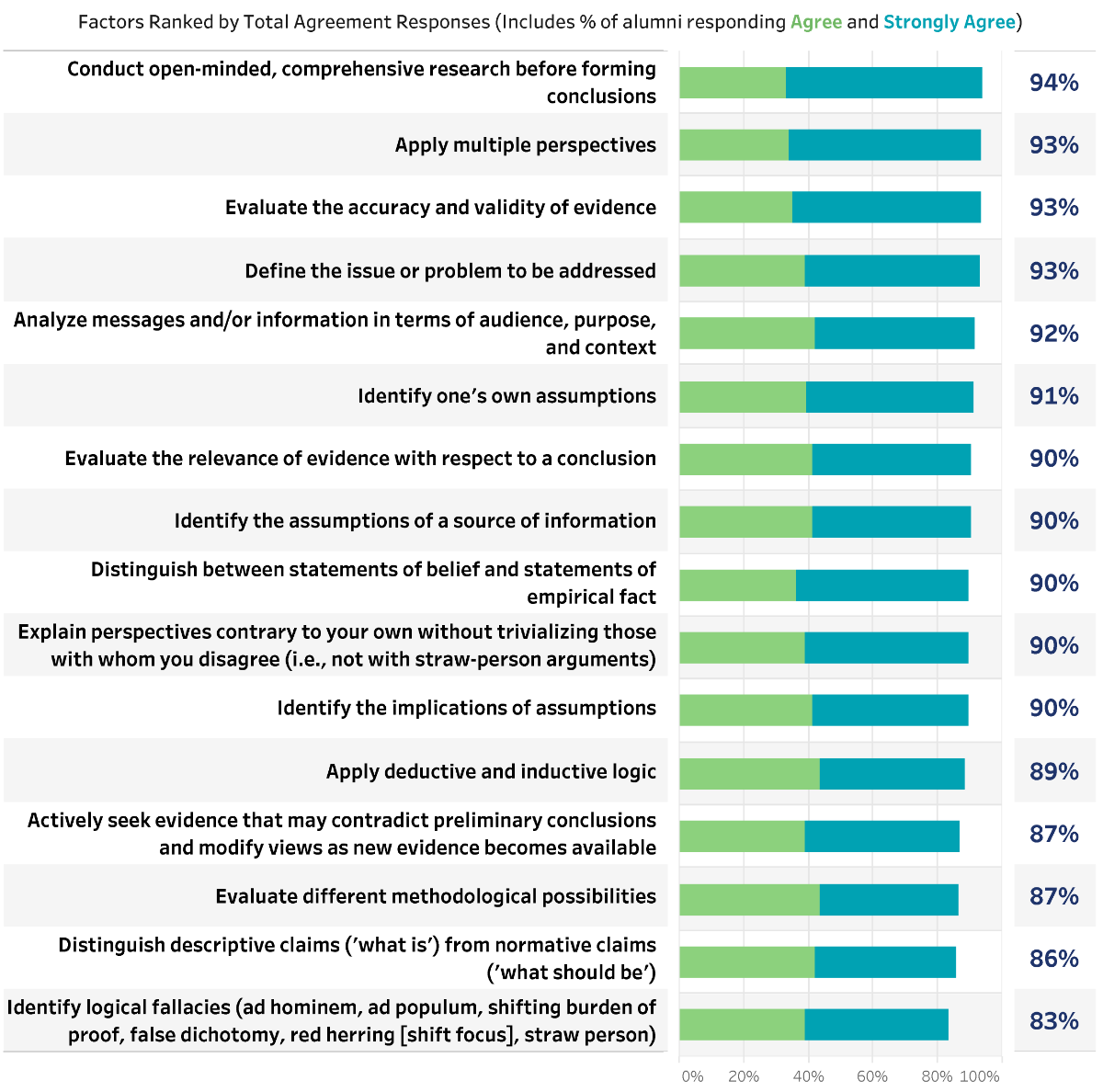
Responses to the question: “Please rate the degree to which the following are central to the definition and teaching of critical thinking...”
*Note: Combined response percentages may differ from sum of other response categories due to rounding.
Question Agree Responses Strongly Agree Responses Combined Agree and Strongly Agree Responses* Conduct open-minded, comprehensive research before forming conclusions 33% 61% 94% Apply multiple perspectives 34% 59% 93% Evaluate the accuracy and validity of evidence 35% 58% 93% Define the issue or problem to be addressed 39% 54% 93% Analyze messages and/or information in terms of audience, purpose, and context 42% 50% 92% Identify one’s own assumptions 39% 52% 91% Evaluate the relevance of evidence with respect to a conclusion 41% 49% 90% Identify the assumptions of a source of information 41% 49% 90% Distinguish between statements of belief and statements of empirical fact* 36% 53% 90% Explain perspectives contrary to your own without trivializing those with whom you disagree (i.e., not with straw-person arguments) 39% 51% 90% Identify the implications of assumptions* 41% 48% 90% Apply deductive and inductive logic* 43% 45% 89% Actively seek evidence that may contradict preliminary conclusions and modify views as new evidence becomes available 39% 48% 87% Evaluate different methodological possibilities 44% 43% 87% Distinguish descriptive claims (‘what is’) from normative claims (‘what should be’) 42% 44% 86% Identify logical fallacies (ad hominem, ad populum, shifting burden of proof, false dichotomy, red herring [shift focus], straw person) 39% 44% 83%
Where can you find more information about the 2020 Alumni Curriculum Study and see data related to your program?
You can access all of the reports from the 2020 Alumni Curriculum Study on the IAR website.
Many of the graphics included in this volume of IAR Insights are from the overview infographic, which can be customized for your program or a specific subset of alumni by using the available filters.
Survey results for all questions are included in our quantitative and qualitative reports:
- The quantitative reports are curated by topic and can be customized using the available filters.
- The open-ended and supplementary (follow-up) question results can be accessed via IAR's Qualitative Survey Reporting Tool (which requires login access).
Connect with IAR
IAR is located in Green Hall (Building 58).
Have questions about any of the analyses mentioned in this volume of IAR Insights or any of IAR's other reports or dashboards?
Register for one of our upcoming Data Exploration Open Labs, which are held twice per month.
You can also contact us at iar@csumb.edu for help with any of our reports or data.
